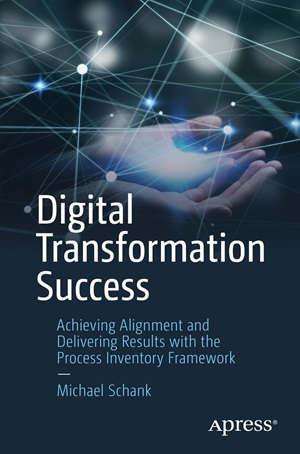Part of what makes Michael Schank’s new book, Digital Transformation Success, so invigorating is the fact Schank is willing to break a cardinal rule of the nonfiction subcategory of business and leadership advice. Simply put, not just sticking to facts – but making his informed convictions personalized. “My journey, which spans over 25 years as a consultant and within large financial services organizations, has been one of continuous learning and discovery. Alongside incredibly talented colleagues and clients, I have encountered a diverse array of challenges across domains such as large-scale transformation, technology, risk, and business operations.
LINKED-IN: https//www.linkedin.com/in/michael-schank
Being naturally curious, I studied each deeply to understand the root challenges and to improve on the standard solutions that were generally accepted,” Schank states. “What became clear was the disconnect that exists across teams, frameworks, and deliverables. Knowledge in one domain was often underutilized or entirely isolated from other domains. For example, strategies conceived at the C-suite level remained disconnected from the realities of what teams were delivering on the ground level, the needs of customers became disconnected from the solutions that technology built, and risk management operated without a detailed understanding of how the business truly operated. These disconnections led to inefficiencies, giving rise to organizational silos, redundancies, exorbitant expenses, and other impediments to achieving organizational agility.”
Enter what Schank has termed the Process Inventory Framework. In a nutshell, the PIF is something of a conceptual roadmap and concurrent breakdown of business practices, something particularly mandatory in an era where more and more the very idea of business and enterprise is becoming, literally, digitized. Meetings are now predominantly remote, connections and deals are made and finalized with a steady internet connection rather than a (hopefully) sponsored plane flight and meeting across the country, or overseas.
A solidified mindset about how to navigate the corporate world and climbing the corporate ladder is more necessary than ever, because thanks to the algorithms it is easier to be left behind. “The disconnects and inefficiencies I observed motivated me to develop and test the Process Inventory framework across numerous financial services organizations. This framework acts as the connective tissue, bridging and addressing virtually all challenges an organization encounters. It serves as an index of organizational knowledge, empowering individuals to understand how their efforts directly support the business’s goals,” writes Schank. “In this book, I aim to educate you on why the Process Inventory framework is the key to transformational success and how to deliver transformational value from it. I cover the high-level vision for organization-wide transformation as well as low-level implementation details…
AMAZON: https://www.amazon.com/Digital-Transformation-Success-Achieving-Delivering/dp/1484298152
This book is tailored for leaders who are driving organizational transformations, including those with titles such as chief transformation officer, chief operating officer, chief information officer, or any leader possessing the motivation and authority to shape their organization’s approach to transformation. The success of this framework hinges on the presence of a senior-level champion who can drive its adoption. Additionally, this book is an invaluable resource for teams tasked with implementing the framework, providing essential insights for members of a Process COE team and practitioners from various domains poised to leverage these models for their specific use cases.”
Cyrus Rhodes



























